Maike Züfle
Beyond Transcripts: A Renewed Perspective on Audio Chaptering
Feb 09, 2026Abstract:Audio chaptering, the task of automatically segmenting long-form audio into coherent sections, is increasingly important for navigating podcasts, lectures, and videos. Despite its relevance, research remains limited and text-based, leaving key questions unresolved about leveraging audio information, handling ASR errors, and transcript-free evaluation. We address these gaps through three contributions: (1) a systematic comparison between text-based models with acoustic features, a novel audio-only architecture (AudioSeg) operating on learned audio representations, and multimodal LLMs; (2) empirical analysis of factors affecting performance, including transcript quality, acoustic features, duration, and speaker composition; and (3) formalized evaluation protocols contrasting transcript-dependent text-space protocols with transcript-invariant time-space protocols. Our experiments on YTSeg reveal that AudioSeg substantially outperforms text-based approaches, pauses provide the largest acoustic gains, and MLLMs remain limited by context length and weak instruction following, yet MLLMs are promising on shorter audio.
F-Actor: Controllable Conversational Behaviour in Full-Duplex Models
Jan 16, 2026Abstract:Spoken conversational systems require more than accurate speech generation to have human-like conversations: to feel natural and engaging, they must produce conversational behaviour that adapts dynamically to the context. Current spoken conversational systems, however, rarely allow such customization, limiting their naturalness and usability. In this work, we present the first open, instruction-following full-duplex conversational speech model that can be trained efficiently under typical academic resource constraints. By keeping the audio encoder frozen and finetuning only the language model, our model requires just 2,000 hours of data, without relying on large-scale pretraining or multi-stage optimization. The model can follow explicit instructions to control speaker voice, conversation topic, conversational behaviour (e.g., backchanneling and interruptions), and dialogue initiation. We propose a single-stage training protocol and systematically analyze design choices. Both the model and training code will be released to enable reproducible research on controllable full-duplex speech systems.
Hearing to Translate: The Effectiveness of Speech Modality Integration into LLMs
Dec 24, 2025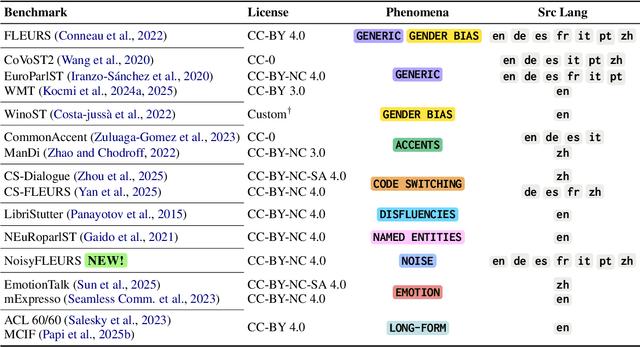
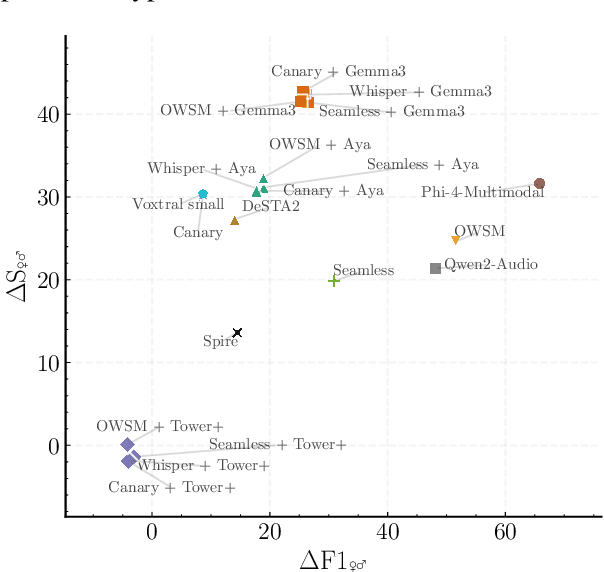
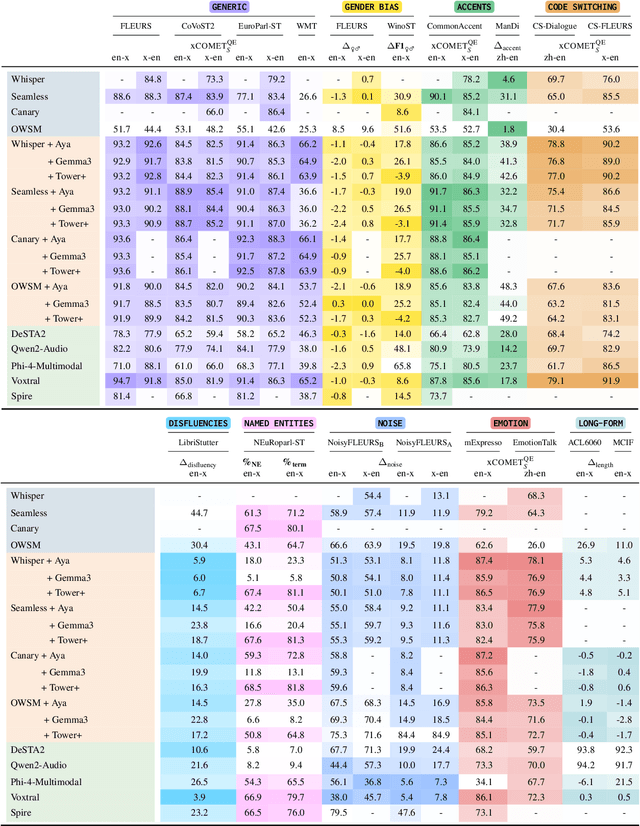
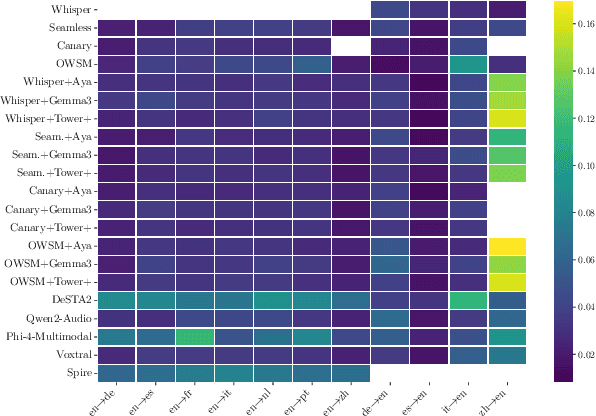
Abstract:As Large Language Models (LLMs) expand beyond text, integrating speech as a native modality has given rise to SpeechLLMs, which aim to translate spoken language directly, thereby bypassing traditional transcription-based pipelines. Whether this integration improves speech-to-text translation quality over established cascaded architectures, however, remains an open question. We present Hearing to Translate, the first comprehensive test suite rigorously benchmarking 5 state-of-the-art SpeechLLMs against 16 strong direct and cascade systems that couple leading speech foundation models (SFM), with multilingual LLMs. Our analysis spans 16 benchmarks, 13 language pairs, and 9 challenging conditions, including disfluent, noisy, and long-form speech. Across this extensive evaluation, we find that cascaded systems remain the most reliable overall, while current SpeechLLMs only match cascades in selected settings and SFMs lag behind both, highlighting that integrating an LLM, either within the model or in a pipeline, is essential for high-quality speech translation.
KIT's Offline Speech Translation and Instruction Following Submission for IWSLT 2025
May 19, 2025



Abstract:The scope of the International Workshop on Spoken Language Translation (IWSLT) has recently broadened beyond traditional Speech Translation (ST) to encompass a wider array of tasks, including Speech Question Answering and Summarization. This shift is partly driven by the growing capabilities of modern systems, particularly with the success of Large Language Models (LLMs). In this paper, we present the Karlsruhe Institute of Technology's submissions for the Offline ST and Instruction Following (IF) tracks, where we leverage LLMs to enhance performance across all tasks. For the Offline ST track, we propose a pipeline that employs multiple automatic speech recognition systems, whose outputs are fused using an LLM with document-level context. This is followed by a two-step translation process, incorporating additional refinement step to improve translation quality. For the IF track, we develop an end-to-end model that integrates a speech encoder with an LLM to perform a wide range of instruction-following tasks. We complement it with a final document-level refinement stage to further enhance output quality by using contextual information.
From Speech to Summary: A Comprehensive Survey of Speech Summarization
Apr 10, 2025Abstract:Speech summarization has become an essential tool for efficiently managing and accessing the growing volume of spoken and audiovisual content. However, despite its increasing importance, speech summarization is still not clearly defined and intersects with several research areas, including speech recognition, text summarization, and specific applications like meeting summarization. This survey not only examines existing datasets and evaluation methodologies, which are crucial for assessing the effectiveness of summarization approaches but also synthesizes recent developments in the field, highlighting the shift from traditional systems to advanced models like fine-tuned cascaded architectures and end-to-end solutions.
NUTSHELL: A Dataset for Abstract Generation from Scientific Talks
Feb 24, 2025Abstract:Scientific communication is receiving increasing attention in natural language processing, especially to help researches access, summarize, and generate content. One emerging application in this area is Speech-to-Abstract Generation (SAG), which aims to automatically generate abstracts from recorded scientific presentations. SAG enables researchers to efficiently engage with conference talks, but progress has been limited by a lack of large-scale datasets. To address this gap, we introduce NUTSHELL, a novel multimodal dataset of *ACL conference talks paired with their corresponding abstracts. We establish strong baselines for SAG and evaluate the quality of generated abstracts using both automatic metrics and human judgments. Our results highlight the challenges of SAG and demonstrate the benefits of training on NUTSHELL. By releasing NUTSHELL under an open license (CC-BY 4.0), we aim to advance research in SAG and foster the development of improved models and evaluation methods.
Early-Exit and Instant Confidence Translation Quality Estimation
Feb 20, 2025Abstract:Quality estimation is omnipresent in machine translation, for both evaluation and generation. Unfortunately, quality estimation models are often opaque and computationally expensive, making them impractical to be part of large-scale pipelines. In this work, we tackle two connected challenges: (1) reducing the cost of quality estimation at scale, and (2) developing an inexpensive uncertainty estimation method for quality estimation. To address the latter, we introduce Instant Confidence COMET, an uncertainty-aware quality estimation model that matches the performance of previous approaches at a fraction of their costs. We extend this to Early-Exit COMET, a quality estimation model that can compute quality scores and associated confidences already at early model layers, allowing us to early-exit computations and reduce evaluation costs. We also apply our model to machine translation reranking. We combine Early-Exit COMET with an upper confidence bound bandit algorithm to find the best candidate from a large pool without having to run the full evaluation model on all candidates. In both cases (evaluation and reranking) our methods reduce the required compute by 50% with very little degradation in performance.
Contrastive Learning for Task-Independent SpeechLLM-Pretraining
Dec 20, 2024

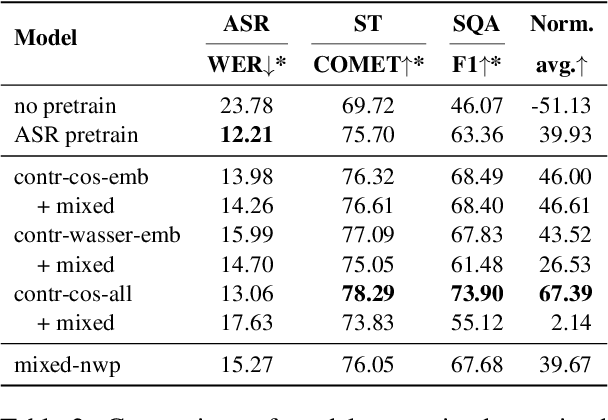

Abstract:Large language models (LLMs) excel in natural language processing but adapting these LLMs to speech processing tasks efficiently is not straightforward. Direct task-specific fine-tuning is limited by overfitting risks, data requirements, and computational costs. To address these challenges, we propose a scalable, two-stage training approach: (1) A task-independent speech pretraining stage using contrastive learning to align text and speech representations over all layers, followed by (2) a task-specific fine-tuning stage requiring minimal data. This approach outperforms traditional ASR pretraining and enables the model to surpass models specialized on speech translation and question answering while being trained on only 10% of the task-specific data.
A Bayesian Optimization Approach to Machine Translation Reranking
Nov 14, 2024



Abstract:Reranking a list of candidates from a machine translation system with an external scoring model and returning the highest-scoring candidate remains a simple and effective method for improving the overall output quality. Translation scoring models continue to grow in size, with the best models being comparable to generation models. Thus, reranking can add substantial computational cost to the translation pipeline. In this work, we pose reranking as a Bayesian optimization (BayesOpt) problem. By strategically selecting candidates to score based on a balance of exploration and exploitation, we show that it is possible to find top-scoring candidates when scoring only a fraction of the candidate list. For instance, our method achieves the same CometKiwi score using only 70 scoring evaluations compared a baseline system using 180. We present a multi-fidelity setting for BayesOpt, where the candidates are first scored with a cheaper but noisier proxy scoring model, which further improves the cost-performance tradeoff when using smaller but well-trained distilled proxy scorers.
Latent Feature-based Data Splits to Improve Generalisation Evaluation: A Hate Speech Detection Case Study
Nov 16, 2023



Abstract:With the ever-growing presence of social media platforms comes the increased spread of harmful content and the need for robust hate speech detection systems. Such systems easily overfit to specific targets and keywords, and evaluating them without considering distribution shifts that might occur between train and test data overestimates their benefit. We challenge hate speech models via new train-test splits of existing datasets that rely on the clustering of models' hidden representations. We present two split variants (Subset-Sum-Split and Closest-Split) that, when applied to two datasets using four pretrained models, reveal how models catastrophically fail on blind spots in the latent space. This result generalises when developing a split with one model and evaluating it on another. Our analysis suggests that there is no clear surface-level property of the data split that correlates with the decreased performance, which underscores that task difficulty is not always humanly interpretable. We recommend incorporating latent feature-based splits in model development and release two splits via the GenBench benchmark.
 Add to Chrome
Add to Chrome Add to Firefox
Add to Firefox Add to Edge
Add to Edge